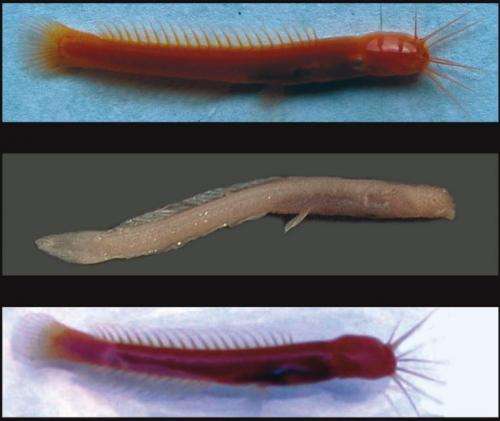December 14, 2012 report
New blind catfish and eel found in India

(Phys.org)—A research team in the southern Indian state of Kerala has discovered a new species of blind catfish living in a deep well. The newly discovered fish was named Horaglanis abdulkalami in honor of a former president of India, Dr. A.P.J. Abdul Kalam, whose contributions to science had inspired the scientists.
The team was led by Dr. Bijoy Nandan of Cochin University of Science and Technology (CUSAT) and Assistant Professor K. K Subash Babu of Jimma University in Ethiopia (who was previously at CUSAT). They were studying the organisms living in the old well in Irinjalakuda in the Thrissur district when they found the blind catfish, which is only 3.5-4 cm long and bright blood-red in color, with no eyes. The catfish feeds on organic matter in the sediments at the bottom of the well.
The fish was examined using a scanning electron microscope (SEM), which revealed its skin was covered in pores, especially in the head area, indicating the fish respires through its skin as well as through the gills.
The blind catfish is the third so far discovered in Kerala state, but H. abdulkalami differs from the other two, H. alikunhii and H. Krishnai, in gill membrane physiology and the structure of its dorsal and caudal fins.
The newly discovered catfish is one of several species of hypogean (living underground) catfish, and like many catfish is a bottom feeder. In the paper, the scientists say that the presence of H. abdulkalami in the old dug-out well indicates it can travel between wells through interconnected water channels through the laterite rocks, as H. alikunhii is known to do.
In the same region the researchers also discovered a previously unknown species of blind eel, which they called Monopterus trichurensis after the district in which they found it. The researchers said their discoveries are significant because the groundwater aquifers in Kerala and elsewhere in India are rich in biodiversity but are poorly documented.
The next phase in the research is to sequence the genome of the catfish to determine its relationships with similar species in India and elsewhere. Further studies are also planned to determine the lifespan of the blind catfish and eel. Dr. Nandan said initial indications were that they could "live for a couple of years."
The paper was published in the Indian science journal Samagra.
More information: Horaglanis abdulkalami, a new hypogean blind catfish (Siluriformes: Clariidae) from Kerala, India. K. K. Subash Babu (51-56) (PDF)
© 2012 Phys.org


















